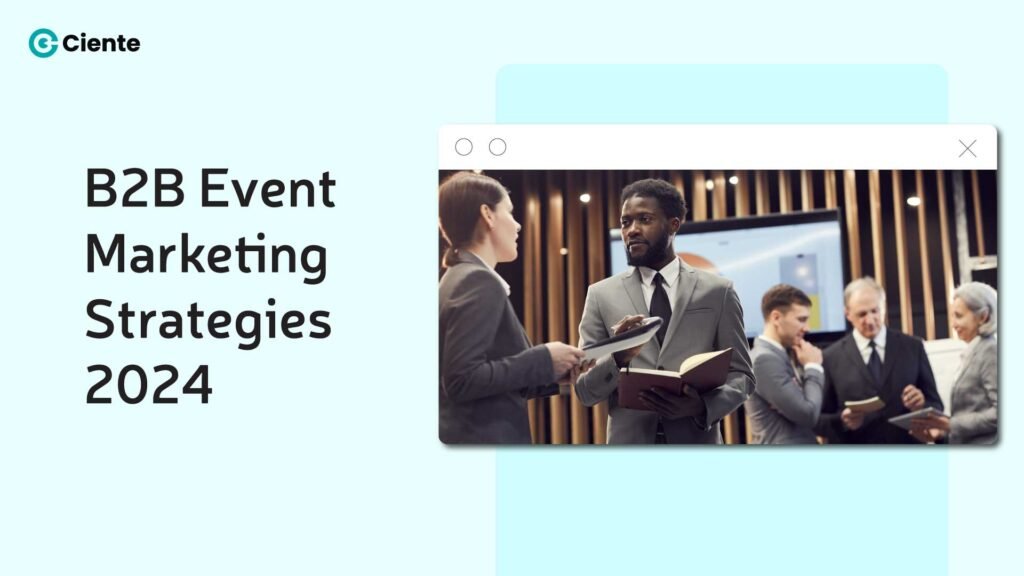Your ideal prospect could be at the next B2B event you are planning to host. Here is how you can ensure you are not missing out on them.
Events are where you meet your potential customers in an informal setting to discuss business and other trending ideas. B2B marketing is getting competitive consistently, and incorporating B2B event marketing could give your business a great potential to connect better with your prospects.
While it sounds easy and fun to execute, there is more to it than deciding the perfect cuisine or the guestlist. Learn how to take your B2B event marketing to the next level with these strategies.
Types of Events
Each event type listed below offers unique benefits. Integrating a mix of these events into your B2B event marketing strategy can deliver increased engagement, stronger relationships, and substantial growth possibilities.
Networking events
Networking events are the most common type of event. They provide an informal atmosphere where professionals can connect, share ideas, and build relationships. These events can include informal meetups at cafes, to more structured networking sessions for facilitating connections and can lead to fruitful collaborations and partnerships.
Conferences
These are large-scale events, often spanning several days. Companies with big budgets usually opt for this as they can invite various speakers, and host panel discussions, and breakout sessions for in-depth discussions on specific topics. Conferences are quintessential for showcasing thought leadership, learning about industry trends, and engaging with a broad audience.
Roundtables
Roundtable discussions are more close-knit and focused. They usually involve a small group of industry leaders or experts discussing thorough topics. This format encourages open dialogue and is excellent for exploring niche subjects, having deep discussions, and sharing expertise.
Workshops
Workshops are highly interactive and provide practical value to attendees by focusing on skill development or knowledge sharing. They are ideal for illustrating your product’s application or apprising your audience of specific industry skills or practices.
Product launches
A well-executed product launch can hit two birds with a single stone. It can announce the presence of your new product in the market and create buzz about your brand. It’s an opportunity to exhibit the value and features of your new offering directly to your target audience and fundamental industry players.
Top B2B Event Marketing Strategies for 2024
Building a successful B2B event marketing strategy is pivotal in steering your business toward its goals.
Identify your target audience and goals
The first step in building any strategy is to pinpoint your target audience. You can achieve this by asking the following questions:
- Who is most likely to benefit from your products/services?
- What are the specific business goals or pain points your potential clients are trying to achieve or solve?
- Where are your prospects located?
- What is the financial capacity of your prospects?
Attracting the right audience is vital for running a successful event. Understand their needs, interests, and pain points and focus on defining the goals of your event based on this data. Your audience and goals will pilot your B2B event marketing strategy.
Choose the right event format
Each format has distinct strengths. You need to choose what would best suit you and align them with what you want to achieve. Will it be a seminar, workshop, or a virtual event? The choice depends on your audience’s preferences and the nature of your goals. For instance, if you want to give your audience a practical experience with your products, you should opt for a workshop. Whereas, opting for a seminar for thought leadership would be ideal.
Create a compelling agenda:
Create an agenda that would provide value to your audience and keep them entertained and hooked to what you have to say. A captivating agenda balances informative sessions with interactive segments. You could also consider inviting industry experts as speakers or incorporating live demonstrations.
Measure and analyze metrics:
Define your KPIs. Remember, it is not necessary to have goals similar to your competition. What works for them might not work for you, and you do not even have to make it work that way. Identify your KPIs and how you want to measure your goals. Some crucial metrics could be attendance rates, engagement levels, leads generated, or social media buzz before the event. These help you understand what went well with your event and how you can improve the next time.
Leverage data-driven improvements
To get the maximum benefits out of your events, maximize the data you get after analyzing the reports. For instance, if your audience positively reacted to a certain topic, you can talk more about that. Or, if you notice issues in any section, you can work on them to give a better experience the next time.
The Bottom Line
Your network could land you your next big client. B2B events make these a reality by giving you and your prospects a chance to interact in an informal setting. It allows you to meet your prospects, talk to them in a way that does not feel too salesy, and make them aware of your product or service – all at the same time.
When this great opportunity knocks on your door, you should be ready to maximize its value. With the strategies given above, you can rely on them to stay ahead of your competition and meet your intent-showing prospects at the right time.

